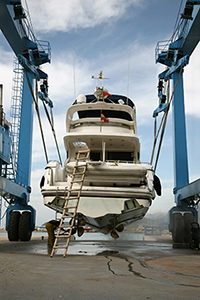Product Care & Maintenance
Schmitt Marine Stainless Steel Wheels & Horns Care & Maintenance
You take great pride in your boat’s steering wheel and horn. You’ve chosen carefully and invested wisely in the sleek and sexy look of stainless, but without proper care and maintenance your boat’s stainless steel components are still at risk of corrosion.
While Stainless Steel has an anti-corrosive coating, maintaining resistance to corrosion can only be achieved by keeping the surface of your components clean and free from harmful contaminates that may reduce protection. Even marine salt deposits can lead to the deterioration of your stainless wheel and horn. While stainless maintenance may sound complicated, it is really quite simple—but there are some definite DOs & DON’Ts to consider in order to maintain the life and luster of your stainless steel components.
DO
- Routinely clean stainless steel with a mild abrasive cleaner such as soap and water using a soft cloth. Dry completely with a soft clean cloth. Glass cleaners also work well on stainless.
- Use car wax with a soft cloth to remove stubborn stains, promote shine and add protection. Dry completely and buff with a soft dry cloth.
- Remove rust spots immediately to avoid irreversible pitting. Chrome, silver and brass cleaners work well.
- Be sure to clean thoroughly if you think your components have been exposed to iron, rust or other non-stainless steels.
- Guard against environmental conditions such as humidity with increased cleanings.
- Clean as often as necessary. Cleaning frequency varies according to conditions and exposure.
DON’T
- Use abrasive cleaning implements like steel wool that will scratch or corrode your stainless.
- Clean with bleaches or mineral acids.
- Expose stainless to iron, steel or other metals that promote rust and corrosion.
AVOID
- Bleach
- Chlorsulphonic Acid
- Comet, Soft Scrub and other cleansers
- EZ-ON, EZ-OFF
- Ferric Chloride
- Ferrous Chloride
- Ferrous Iodide
- Flourine
- Hydrobromic Acid
- Hydrochloric Acid
- Hydroflouric Acid
- Hydrofluoailicic Acid
- Iodine
- Marine Spray Nine
- Muriatic Acid
- On & Off Cleaner
- Rust Stains Away
- Silver Chloride
- SnoBol
- Sodium Biflouride
- Sodium Chlorite
- Sodium Hypochlorite
- Stannic Chloride
- Sulphur Chloride
- Sulphuric Acid
Polyurethane Wheel Care and Maintenance
While polyurethane is a low maintenance material, giving it a little TLC each time you use your boat will go a long way in extending the life of your wheel. A mild detergent, (such as Simple Green) diluted in fresh water will clean away most dirt and debris that may have collected on your wheel. We recommend keeping a spray bottle of this gentle cleanser on hand for quick clean-ups. Washing your wheel often is essential, especially in a salt water environment.
The other enemy of polyurethane is hot sun. To minimize the impact of the sun’s rays on your wheel, we recommend using a product such as Armor All Wheel Protectant to help keep the material supple. You can further protect your wheel by covering it when not in use.
These short and easy steps will help you preserve your Schmitt Marine Polyurethane Wheel so you can enjoy using it for many boating seasons.
Wiper System Care & Maintenance
To keep your system working optimally, we recommend changing your wiper blades every six months to a year, which varies depending on usage and weather conditions. Deterioration of your wiper blades is often a result of prolonged exposure to sun, wind, rain, salt water and airborne debris. When you begin to notice a drop in performance, generally defined by streaking, skipping and squeaking—it’s time to inspect your system and replace your blades.
Inspection Tips
- Check Frame to ensure that it is intact, connected properly to the blade, and free from rust or corrosion.
- Check Blades for loss of flexibility, cracks or rounded edges that can result in gaps of direct contact with your windshield, causing streaking and loss of visibility.
You can extend the life of your wipers by keeping your windshield clean and removing any damage causing debris from your blades. The important thing to know is not to wait until you need your wipers the most—your safety may depend on it.
Wiper Motors
Waterproof motors are designed to get wet, so they can be rinsed off without adversely affecting their performance. Regular motors can be wiped off with a damp cloth, but should never be hosed off or bucket washed.

